- Home
- Samuel Beckett
The Collected Shorter Plays Page 6
The Collected Shorter Plays Read online
Page 6
[Pause.]
Past midnight. Never knew such silence. The earth might be uninhabited.
[Pause.] Here I end—
[Krapp switches off, winds tape back, switches on again.]
—upper lake, with the punt, bathed off the bank, then pushed out into the stream and drifted. She lay stretched out on the floorboards with her hands under her head and her eyes closed. Sun blazing down, bit of a breeze, water nice and lively. I noticed a scratch on her thigh and asked her how she came by it. Picking gooseberries, she said. I said again I thought it was hopeless and no good going on and she agreed, without opening her eyes. [Pause.] I asked her to look at me and after a few moments—[pause]—after a few moments she did, but the eyes just slits, because of the glare. I bent over her to get them in the shadow and they opened. [Pause. Low.] Let me in. [Pause.] We drifted in among the flags and stuck. The way they went down, sighing, before the stem! [Pause.] I lay down across her with my face in her breasts and my hand on her. We lay there without moving. But under us all moved, and moved us, gently, up and down, and from side to side.
[Pause.]
Past midnight. Never knew—
[Krapp switches off, broods. Finally he fumbles in his pockets, encounters the banana, takes it out, peers at it, puts it back, fumbles, brings out envelope, fumbles, puts back envelope, looks at his watch, gets up and goes backstage into darkness. Ten seconds. Sound of bottle against glass, then brief siphon. Ten seconds. Bottle against glass alone. Ten seconds. He comes back a little unsteadily into light, goes to front of table, takes out keys, raises them to his eyes, chooses key, unlocks first drawer, peers into it, feels about inside, takes out reel, peers at it, locks drawer, puts keys back in his pocket, goes and sits down, takes reel off machine, lays it on dictionary, loads virgin reel on machine, takes envelope from his pocket, consults back of it, lays it on table, switches on, clears his throat and begins to record.]
KRAPP
Just been listening to that stupid bastard I took myself for thirty years ago, hard to believe I was ever as bad as that. Thank God that’s all done with anyway. [Pause.] The eyes she had! [Broods, realizes he is recording silence, switches off, broods. Finally.] Everything there, everything, all the— [Realizes this is not being recorded, switches on.] Everything there, everything on this old muckball, all the light and dark and famine and feasting of . . . [hesitates] . . . the ages! [In a shout.] Yes! [Pause.] Let that go! Jesus! Take his mind off his homework! Jesus! [Pause. Weary.] Ah well, maybe he was right. [Pause.] Maybe he was right. [Broods. Realizes. Switches off. Consults envelope.] Pah! [Crumples it and throws it away. Broods. Switches on.] Nothing to say, not a squeak. What’s a year now? The sour cud and the iron stool. [Pause.] Revelled in the word spool. [With relish.] Spooool! Happiest moment of the past half million. [Pause.] Seventeen copies sold, of which eleven at trade price to free circulating libraries beyond the seas. Getting known. [Pause.] One pound six and something, eight I have little doubt. [Pause.] Crawled out once or twice, before the summer was cold. Sat shivering in the park, drowned in dreams and burning to be gone. Not a soul. [Pause.] Last fancies. [Vehemently.] Keep ’em under! [Pause.] Scalded the eyes out of me reading Effie again, a page a day, with tears again. Effie. . . . [Pause.] Could have been happy with her, up there on the Baltic, and the pines, and the dunes. [Pause.] Could I? [Pause.] And she? [Pause.] Pah! [Pause.] Fanny came in a couple of times. Bony old ghost of a whore. Couldn’t do much, but I suppose better than a kick in the crutch. The last time wasn’t so bad. How do you manage it, she said, at your age? I told her I’d been saving up for her all my life. [Pause.] Went to Vespers once, like when I was in short trousers. [Pause. Sings.]
Now the day is over,
Night is drawing nigh-igh,
Shadows—[coughing, then almost inaudible]—of the evening
Steal across the sky.
[Gasping.] Went to sleep and fell off the pew. [Pause.] Sometimes wondered in the night if a last effort mightn’t— [Pause.] Ah finish your booze now and get to your bed. Go on with this drivel in the morning. Or leave it at that. [Pause.] Leave it at that. [Pause.] Lie propped up in the dark—and wander. Be again in the dingle on a Christmas Eve, gathering holly, the red-berried. [Pause.] Be again on Croghan on a Sunday morning, in the haze, with the bitch, stop and listen to the bells. [Pause.] And so on. [Pause.] Be again, be again. [Pause.] All that old misery. [Pause.] Once wasn’t enough for you. [Pause.] Lie down across her. [Long pause. He suddenly bends over machine, switches off, wrenches off tape, throws it away, puts on the other, winds it forward to the passage he wants, switches on, listens staring front.]
TAPE
—gooseberries, she said. I said again I thought it was hopeless and no good going on and she agreed, without opening her eyes. [Pause.] I asked her to look at me and after a few moments—[pause]—after a few moments she did, but the eyes just slits, because of the glare. I bent over to get them in the shadow and they opened. [Pause. Low.] Let me in. [Pause.] We drifted in among the flags and stuck. The way they went down, sighing, before the stem! [Pause.] I lay down across her with my face in her breasts and my hand on her. We lay there without moving. But under us all moved, and moved us, gently, up and down, and from side to side.
[Pause. Krapp’s lips move. No sound.]
Past midnight. Never knew such silence. The earth might be uninhabited.
[Pause.]
Here I end this reel. Box—[pause]—three, spool—[pause]—five. [Pause.] Perhaps my best years are gone. When there was a chance of happiness. But I wouldn’t want them back. Not with the fire in me now. No, I wouldn’t want them back.
[Krapp motionless staring before him. The tape runs on in silence.]
Curtain
ROUGH FOR THEATRE I
Street corner. Ruins.
A, blind, sitting on a folding-stool, scrapes his fiddle. Beside him the case, half open, upended, surmounted by alms bowl. He stops playing, turns his head audience right, listens. Pause.
A A penny for a poor old man, a penny for a poor old man. [Silence. He resumes playing, stops again, turns his head right, listens. Enter B right, in a wheelchair which he propels by means of a pole. He halts. Irritated.] A penny for a poor old man!
[Pause.]
B Music! [Pause.] So it is not a dream. At last! Nor a vision, they are mute and I am mute before them. [He advances, halts, looks into bowl. Without emotion.] Poor wretch. [Pause.] Now I may go back, the mystery is over. [He pushes himself backwards, halts.] Unless we join together, and live together, till death ensue. [Pause.] What would you say to that, Billy, may I call you Billy, like my son? [Pause.] Do you like company, Billy? [Pause.] Do you like tinned food, Billy?
A What tinned food?
B Corned beef, Billy, just corned beef. Enough to keep body and soul together, till summer, with care. [Pause.] No? [Pause.] A few potatoes too, a few pounds of potatoes too. [Pause.] Do you like potatoes, Billy? [Pause.] We might even let them sprout and then, when the time came, put them in the ground, we might even try that. [Pause.] I would choose the place and you would put them in the ground.
[Pause.] No? [Pause.]
A How are the trees doing?
B Hard to say. It’s winter, you know.
[Pause.]
A Is it day or night?
B Oh . . . [he looks at the sky] . . . day, if you like. No sun of course, otherwise you wouldn’t have asked. [Pause.] Do you follow my reasoning? [Pause.] Have you your wits about you, Billy, have you still some of your wits about you?
A But light?
B Yes. [Looks at sky.] Yes, light, there is no other word for it. [Pause.] Shall I describe it to you? [Pause.] Shall I try to give you an idea of this light?
A It seems to me sometimes I spend the night here, playing and listening. I used to feel twilight gather and make myself ready. I put away fiddle and bowl and had only to get to my feet, when she took me by the hand.
[Pause.]
B She?
A My woman. [Pause.] A woman. [Pa
use.] But now . . .
[Pause.]
B Now?
A When I set out I don’t know, and when I get here I don’t know, and while I am here I don’t know, whether it is day or night.
B You were not always as you are. What befell you? Women? Gambling? God?
A I was always as I am.
B Come!
A [violently] I was always as I am, crouched in the dark, scratching an old jangle to the four winds!
B [violently] We had our women, hadn’t we? You yours to lead you by the hand and I mine to get me out of the chair in the evening and back into it again in the morning and to push me as far as the corner when I went out of my mind.
A Cripple? [Without emotion.] Poor wretch.
B Only one problem: the about-turn. I often felt, as I struggled, that it would be quicker to go on, right round the world. Till the day I realized I could go home backwards. [Pause.] For example, I am at A. [He pushes himself forward a little, halts.] I push on to B. [He pushes himself back a little, halts.] And I return to A. [With élan.] The straight line! The vacant space! [Pause.] Do I begin to move you?
A Sometimes I hear steps. Voices. I say to myself, They are coming back, some are coming back, to try and settle again, or to look for something they had left behind, or to look for someone they had left behind.
B Come back! [Pause.] Who would want to come back here? [Pause.] And you never called out? [Pause.] Cried out? [Pause.] No?
A Have you observed nothing?
B Oh me you know, observe . . . I sit there, in my lair, in my chair, in the dark, twenty-three hours out of the twenty-four. [Violently.] What would you have me observe? [Pause.] Do you think we would make a match, now you are getting to know me?
A Corned beef, did you say?
B Apropos, what have you been living on, all this time? You must be famished.
A There are things lying around.
B Edible?
A Sometimes.
B Why don’t you let yourself die?
A On the whole I have been lucky. The other day I tripped over a sack of nuts.
B No!
A A little sack, full of nuts, in the middle of the road.
B Yes, all right, but why don’t you let yourself die?
A I have thought of it.
B [irritated] But you don’t do it!
A I’m not unhappy enough. [Pause.] That was always my unhap, unhappy, but not unhappy enough.
B But you must be every day a little more so.
A [violently] I am not unhappy enough!
[Pause.]
B If you ask me we were made for each other.
A [comprehensive gesture] What does it all look like now?
B Oh me you know . . . I never go far, just a little up and down before my door. I never yet pushed on to here till now.
A But you look about you?
B No no.
A After all those hours of darkness you don’t—
B [violently] No! [Pause.] Of course if you wish me to look about me I shall. And if you care to push me about I shall try to describe the scene, as we go along.
A You mean you would guide me? I wouldn’t get lost any more?
B Exactly. I would say, Easy, Billy, we’re heading for a great muckheap, turn back and wheel left when I give you the word.
A You’d do that!
B [pressing his advantage] Easy, Billy, easy, I see a round tin over there in the gutter, perhaps it’s soup, or baked beans.
A Baked beans!
[Pause.]
B Are you beginning to like me? [Pause.] Or is it only my imagination?
A Baked beans! [He gets up, puts down fiddle and bowl on the stool and gropes towards B.] Where are you?
B Here, dear fellow. [A lays hold of the chair and starts pushing it blindly.] Stop!
A [pushing the chair] It’s a gift! A gift!
B Stop! [He strikes behind him with the pole. A lets go the chair, recoils. Pause. A gropes towards his stool, halts, lost.] Forgive me! [Pause.] Forgive me, Billy!
A Where am I? [Pause.] Where was I?
B Now I’ve lost him. He was beginning to like me and I struck him. He’ll leave me and I’ll never see him again. I’ll never see anyone again. We’ll never hear the human voice again.
A Have you not heard it enough? The same old moans and groans from the cradle to the grave.
B [groaning] Do something for me, before you go!
A There! Do you hear it? [Pause. Groaning.] I can’t go! [Pause.] Do you hear it?
B You can’t go?
A I can’t go without my things.
B What good are they to you?
A None.
B And you can’t go without them?
A No. [He starts groping again, halts.] I’ll find them in the end. [Pause.] Or leave them for ever behind me.
[He starts groping again.]
B Straighten my rug, I feel the cold air on my foot. [A halts.] I’d do it myself, but it would take too long. [Pause.] Do that for me, Billy. Then I may go back, settle in the old nook again and say, I have seen man for the last time, I struck him and he succoured me. [Pause.] Find a few rags of love in my heart and die reconciled, with my species. [Pause.] What has you gaping at me like that? [Pause.] Have I said something I shouldn’t have? [Pause.] What does my soul look like?
[A gropes towards him.]
A Make a sound.
[B makes one. A gropes towards it, halts.]
B Have you no sense of smell either?
A It’s the same stink everywhere. [He stretches out his hand.] Am I within reach of your hand?
[He stands motionless with outstretched hand.]
B Wait, you’re not going to do me a service for nothing? [Pause.] I mean unconditionally? [Pause.] Good God!
[Pause. He takes A’s hand and draws it towards him.]
A Your foot.
B What?
A You said your foot.
B Had I but known! [Pause.] Yes, my foot, tuck it in. [A stoops, groping.] On your knees, on your knees, you’ll be more at your ease. [He helps him to kneel at the right place.] There.
A [irritated] Let go my hand! You want me to help you and you hold my hand! [B lets go his hand. A fumbles in the rug.] Have you only one leg?
B Just the one.
A And the other?
B It went bad and was removed.
[A tucks in the foot.]
A Will that do?
B A little tighter. [A tucks in tighter.] What hands you have!
[Pause.]
A [groping towards B’s torso] Is all the rest there?
B You may stand up now and ask me a favour.
A Is all the rest there?
B Nothing else has been removed, if that is what you mean.
[A’s hand, groping higher, reaches the face, stays.]
A Is that your face?
B I confess it is. [Pause.] What else could it be? [A’s fingers stray, stay.] That? My wen.
A Red?
B Purple. [A withdraws his hand, remains kneeling.] What hands you have!
[Pause.]
A Is it still day?
B Day? [Looks at sky.] If you like. [Looks.] There is no other word for it.
A Will it not soon be evening?
[B stoops to A, shakes him.]
B Come, Billy, get up, you’re beginning to incommode me.
A Will it not soon be night?
[B looks at sky.]
B Day . . . night . . . [Looks.] It seems to me sometimes the earth must have got stuck, one sunless day, in the heart of winter, in the grey of evening. [Stoops to A, shakes him.] Come on, Billy, up, you’re beginning to embarrass me.
A Is there grass anywhere?
B I see none.
A [vehement] Is there no green anywhere?
B There’s a little moss. [Pause. A clasps his hands on the rug and rests his head on them.] Good God! Don’t tell me you’re going to pray?
A No.
B Or weep?
A No. [Pause.] I could stay like that for ever, with my head on an old man’s knees.
B Knee. [Shaking him roughly.] Get up, can’t you!
A [settling himself more comfortably] What peace! [ B pushes him roughly away, A falls to his hands and knees.] Dora used to say, the days I hadn’t earned enough, You and your harp! You’d do better crawling on all fours, with your father’s medals pinned to your arse and a money box round your neck. You and your harp! Who do you think you are? And she made me sleep on the floor. [Pause.] Who I thought I was . . . [Pause.] Ah that . . . I never could . . . [Pause. He gets up.] Never could . . . [He starts groping again for his stool, halts, listens.] If I listened long enough I’d hear it, a string would give.
B Your harp? [Pause.] What’s all this about a harp?
A I once had a little harp. Be still and let me listen.
[Pause.]
B How long are you going to stay like that?
A I can stay for hours listening to all the sounds.
[They listen.]
B What sounds?
A I don’t know what they are.
[They listen.]
B I can see it. [Pause.] I can—
A [imploring] Will you not be still?
B No! [A takes his head in his hands.] I can see it clearly, over there on the stool. [Pause.] What if I took it, Billy, and made off with it? [Pause.] Eh Billy, what would you say to that? [Pause.] There might be another old man, some day, would come out of his hole and find you playing the mouth-organ. And you’d tell him of the little fiddle you once had. [Pause.] Eh Billy? [Pause.] Or singing. [Pause.] Eh Billy, what would you say to that? [Pause.] There croaking to the winter wind [rime with unkind], having lost his little mouth-organ. [He pokes him in the back with the pole.] Eh Billy? [A whirls round, seizes the end of the pole and wrenches it from B’s grasp.]
ROUGH FOR THEATRE II
Upstage centre high double window open on bright night sky. Moon invisible.
Downstage audience left, equidistant from wall and axis of window, small table and chair. On table an extinguished reading-lamp and a briefcase crammed with documents.
Downstage right, forming symmetry, identical table and chair. Extinguished lamp only.

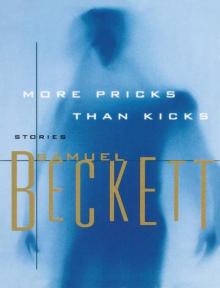 More Pricks Than Kicks
More Pricks Than Kicks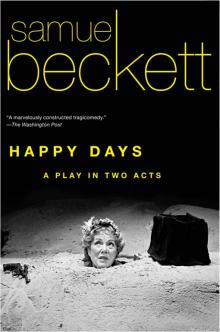 Happy Days
Happy Days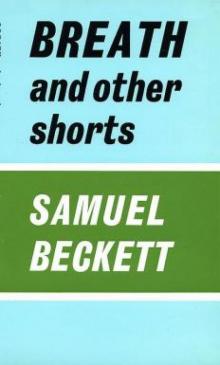 Breath, and Other Shorts
Breath, and Other Shorts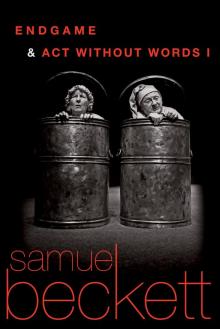 Endgame & Act Without Words
Endgame & Act Without Words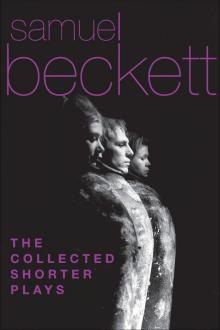 The Collected Shorter Plays of Samuel Beckett
The Collected Shorter Plays of Samuel Beckett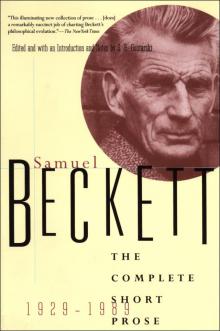 The Complete Short Prose, 1929-1989
The Complete Short Prose, 1929-1989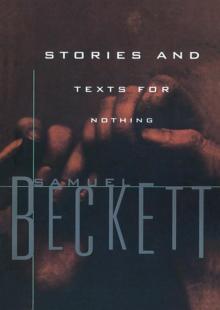 Stories and Texts for Nothing
Stories and Texts for Nothing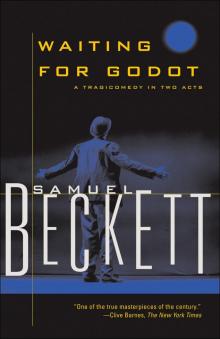 Waiting for Godot
Waiting for Godot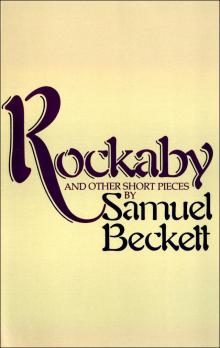 Rockaby and Other Short Pieces
Rockaby and Other Short Pieces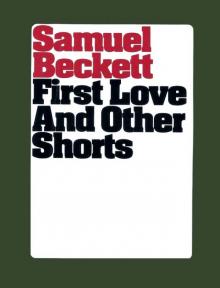 First Love and Other Shorts
First Love and Other Shorts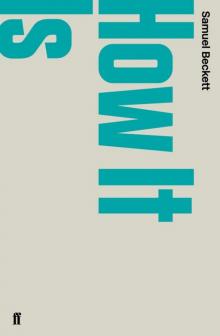 How It Is
How It Is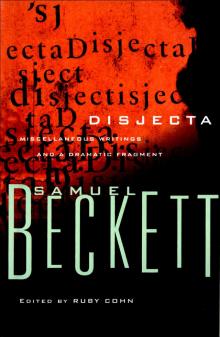 Disjecta: Miscellaneous Writings and a Dramatic Fragment
Disjecta: Miscellaneous Writings and a Dramatic Fragment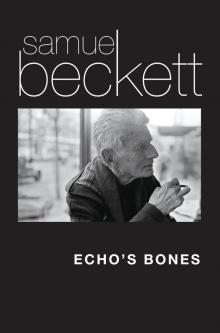 Echo's Bones
Echo's Bones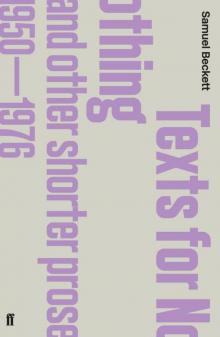 Texts for Nothing and Other Shorter Prose 1950-1976
Texts for Nothing and Other Shorter Prose 1950-1976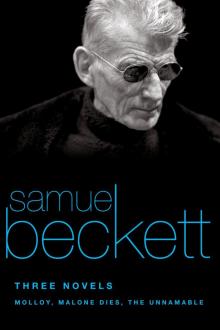 Three Novels
Three Novels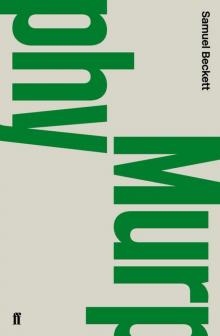 Murphy
Murphy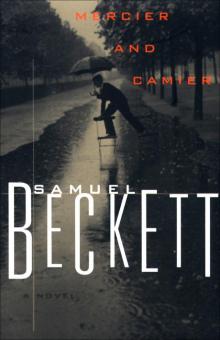 Mercier and Camier
Mercier and Camier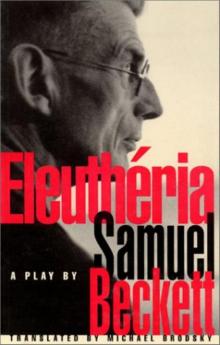 Eleuthéria
Eleuthéria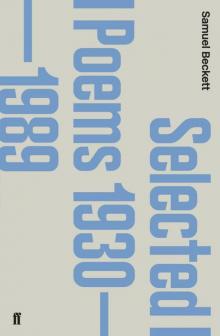 Selected Poems 1930-1988
Selected Poems 1930-1988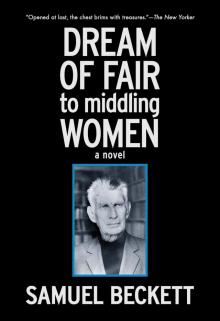 Dream of Fair to Middling Women
Dream of Fair to Middling Women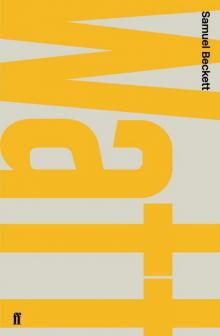 Watt
Watt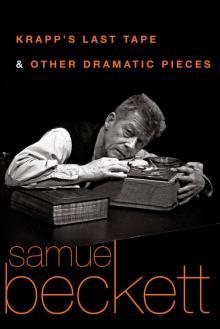 Krapp's Last Tape and Other Dramatic Pieces
Krapp's Last Tape and Other Dramatic Pieces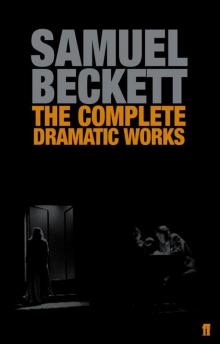 The Complete Dramatic Works of Samuel Beckett
The Complete Dramatic Works of Samuel Beckett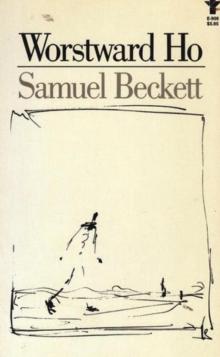 Worstward Ho
Worstward Ho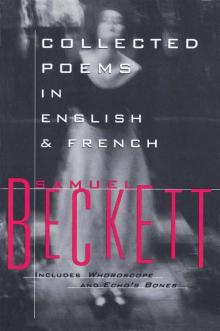 Collected Poems in English and French
Collected Poems in English and French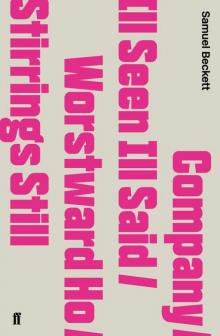 Company / Ill Seen Ill Said / Worstward Ho / Stirrings Still
Company / Ill Seen Ill Said / Worstward Ho / Stirrings Still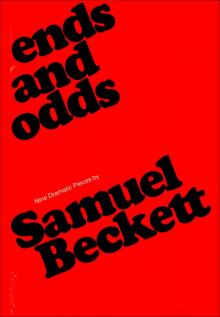 Ends and Odds
Ends and Odds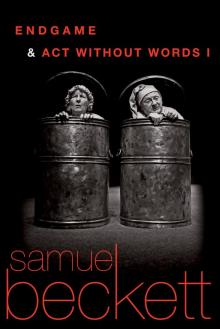 Endgame Act Without Words I
Endgame Act Without Words I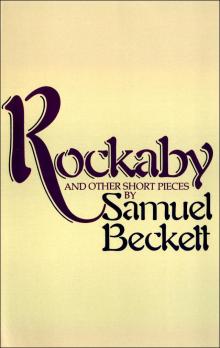 Rockabye and Other Short Pieces
Rockabye and Other Short Pieces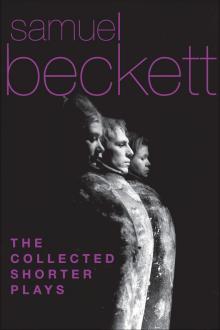 The Collected Shorter Plays
The Collected Shorter Plays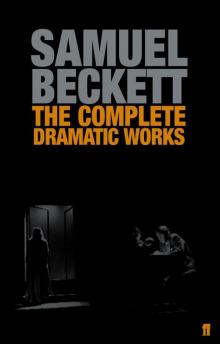 The Complete Dramatic Works
The Complete Dramatic Works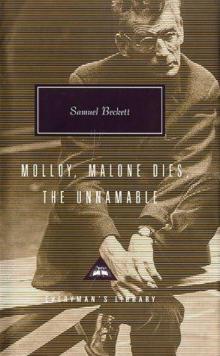 Three Novels: Malloy, Malone Dies, The Unnamable
Three Novels: Malloy, Malone Dies, The Unnamable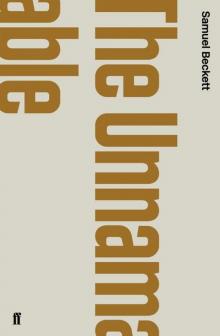 The Unnamable
The Unnamable